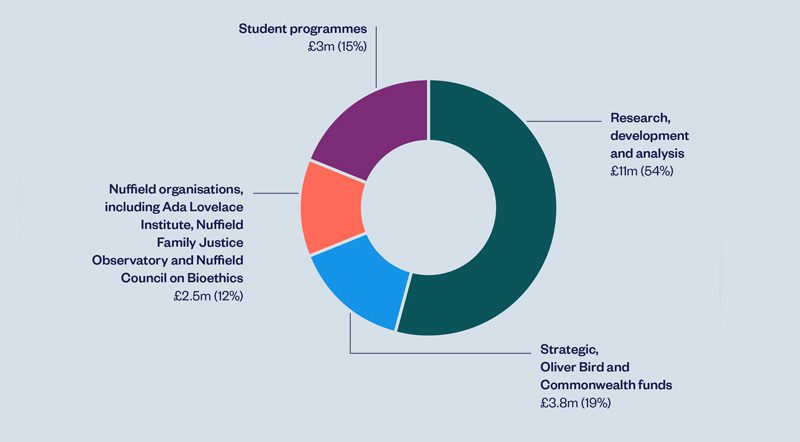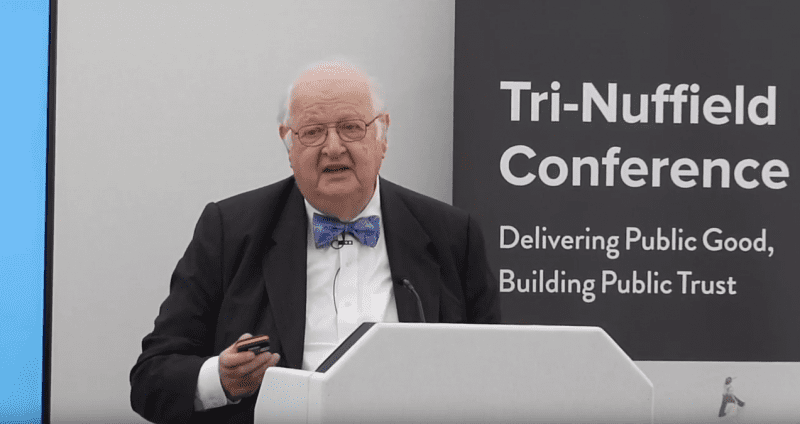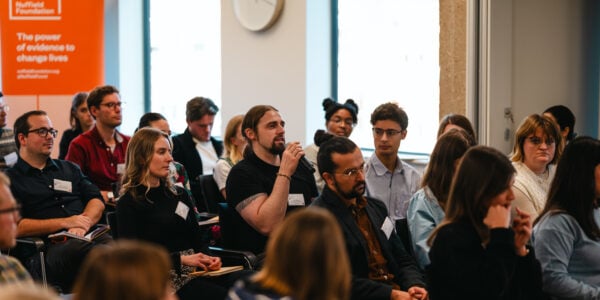During 2019 we made our highest ever commitment to charitable spending at £20.3 million. This supports our mission to advance educational opportunity and social well-being. The end of 2019 marked the mid-point of our five-year strategy. In our annual report and financial statements, published today, we take stock of what we have achieved so far.
Our charitable spending
- At £20.3 million, our charitable spending was 11% higher than in 2018. This was almost double the ten-year average before the implementation of our new strategy.
- Our £11 million expenditure on research, development and analysis included £9.1 million of grants awarded across our core domains of Education, Welfare and Justice.
- We launched our Strategic Fund for ambitious, interdisciplinary projects and awarded £101k to 21 organisations to do some initial work before applying to the fund.
- We awarded £3.75 million for pioneering research grants to improve the lives of people living with musculoskeletal conditions.
- We awarded £2.5 million for the Ada Lovelace Institute, Nuffield Family Justice Observatory and the Nuffield Council on Bioethics – independent bodies we have established to examine areas central to our research agenda in more depth.
- Our student programmes expenditure included £2.1 million for Q-Step, our programme to improve social science training for undergraduates, as well as funding for Nuffield Research Placements, which provide opportunities for young people from disadvantaged backgrounds to gain skills and experience in science and research.

The power of evidence to change lives
We fund research that informs social policy and has an impact on people’s lives. Our annual report features examples of the impact our work has had, including:
- Informing the government’s teacher recruitment and retention strategy through the NFER work we have funded on the teaching workforce.
- Generating support for protecting school breaktimes from within Parliament, the media and from parents’ groups, as a result of the work we have funded on school breaktimes.
- Ensuring the public had access to independent evidence on key issues in the run-up to the 2019 General Election through our funding of the IFS, Full Fact, NIESR and EPI.
- Providing evidence on children’s access to food and stimulating Parliamentary debate through our funding of the Food Foundation and its Future Food Inquiry and #Right2FoodCharter.
- Paving the way for a fairer divorce law that will reduce conflict and suffering for separating couples and their children by funding and publishing Professor Liz Trinder’s Finding Fault research.
- Informing the Age of Criminal Responsibility (Scotland) Act 2019, which increased the age of criminal responsibility in Scotland from 8 to 12, drawing on evidence from the Nuffield-funded Edinburgh Study of Youth Transitions and Crime.
- Increasing opportunities for young people from less well-off backgrounds to gain skills and experience in science and research. For the first time, 100% of Nuffield Research Placements were awarded to Year 12 students who were entitled to free school meals or the first in family to go to university. An independent evaluation of the programme found that students who undertake a work placement are more likely to go on to study a STEM course at a Russell Group University.
In 2019, the Foundation made great strides towards fulfilling the objectives of our five-year strategy. At £20.3m, we made our highest ever commitment to charitable spending – up 11% from 2018 and almost double the ten-year average preceding the implementation of our strategy. Our work is wide-ranging but is underpinned by a common set of principles: freedom and independence, commitment to quality, connecting perspectives, building trust in evidence, and enabling opportunity.Professor Keith Burnett, Chair of the Nuffield Foundation
Across our organisations
We also report on the early impact of the Ada Lovelace Institute and Nuffield FJO in their first full year of operation. We have established these organisations to further our work in two areas central to our mission to advance social well-being – digital society and family justice.
The Nuffield FJO’s influential Born into care series highlighted the experiences of all those involved in the painful process of removing infants at birth, as well as the regional variations in practice and prevalence. The Nuffield FJO is now developing guidelines for health and social work professionals in this area.
The Ada Lovelace Institute’s influential Beyond face value report recommended that companies should temporarily stop selling and using facial recognition technology while the public is consulted on its use. This call for a moratorium has since received support from other quarters, including the House of Commons Science and Technology Select Committee, the Financial Times and AI Now. It is also being considered by the European Commission.
The Nuffield Council on Bioethics, established by the Foundation in the 1990s and co-funded by the MRC and Wellcome, continues to inform policy and public debate about the ethical questions raised by biological and medical research. The Council’s research on non-invasive prenatal testing (first published in 2017) was instrumental in framing government policy. Its report on genetic editing focused the ethical argument at the sharpest edge of genetic science.
New funding opportunities
In 2019 we made the first call for applications to our £15 million Strategic Fund. Priorities for our Strategic Fund were informed during a conference in May, convened jointly with the Nuffield Trust and Nuffield College. The conference sought to stimulate cross-disciplinary thinking on the major challenges for UK social policy in the 2020s and the research agenda that could help address them. The keynote speech was delivered by Professor Sir Angus Deaton, Chair of the IFS Deaton Review, which was funded by the Foundation and is the most ambitious study of inequality yet attempted.
Looking ahead
As were finalising our 2019 annual report, the scale and severity of COVID-19 was becoming apparent and we have had to alter some of our plans for 2020. Across the Foundation, we have responded to help address some of the social impacts of the pandemic:
- We have awarded £2 million in funding for ten new projects to address the social implications of the pandemic, and made additional grants to other projects to enable them to re-purpose their work to do the same.
- We have developed Nuffield Future Researchers, an exciting online alternative to the 2020 Nuffield Research Placement programme that enables students to participate in research from home, working with experts in a virtual learning environment.
- The Ada Lovelace Institute’s Exit through the App Store? report has been influential in the debate about whether, and how, the government should use technology in its public health response to the pandemic.
- The Nuffield FJO ran a rapid consultation on remote hearings in the family courts, which informed the development of the President of the Family Division’s ‘road ahead’ through the pandemic.
- The Nuffield Council on Bioethics is working to provide support, information and advice to ensure that ethics is a key consideration in rapidly developing government and societal responses to the COVID-19 pandemic.
In addition to our pandemic response, we have begun to deliver planned activity for 2020. In April we announced £3.9 million in research funding to six research teams across five UK Universities to improve the lives of people living with musculoskeletal (MSK) conditions by influencing policy and practice. The new, interdisciplinary research projects will create new datasets as well as exploiting existing data in new and innovative ways.
In May, an independent evaluation by the Education Endowment Foundation (EEF) found that the Nuffield Early Language Intervention (NELI) boosts the language skills of four- and five-year olds by an additional three months.
We have launched The changing face of early childhood, a new series of reports and events to bring together the research evidence on early childhood in the UK and present recommendations for policy and practice, as well as priorities for research.
Whatever shape British society now takes, the Foundation’s focus will remain on safeguarding the well-being of individuals and communities, and the most vulnerable within them, by providing the evidence and analysis on which effective and just policy is founded.Tim Gardam, Chief Executive of the Nuffield Foundation
Our 2019 annual report presents the work we have undertaken towards achieving our strategic goals and publishes our accounts for the year.


















































